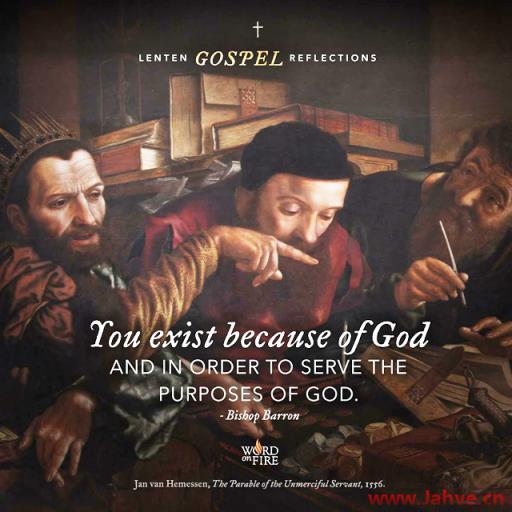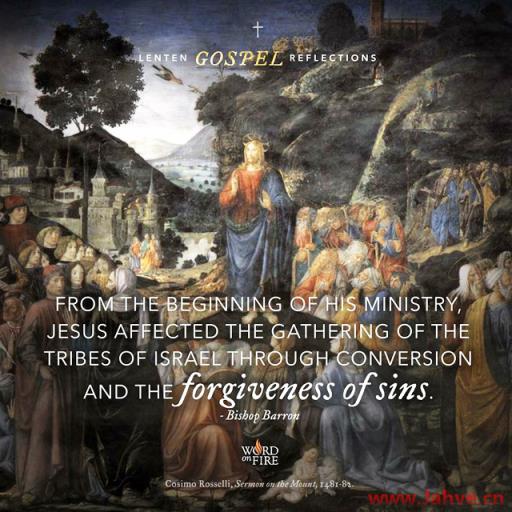 Bishop Barron翻译|Carrie2018-3-6
Bishop Barron翻译|Carrie2018-3-6 朋友们,今天的福音说的比喻是记仇的仆人,揭示了我们无法宽恕别人的原因。从最深层次的意义来说,我们不属于自己。我们拥有的一切以及我们的整个存在都来自天主。我们本来就是要运用自身的天赋来为天主的旨意效犬马之劳。我们的生命完全来自于天主,但同样,只有天主才能宽恕我们的罪过。虽然我们身无寸功,基督仍为我们的罪过而受死并给予我们神圣的慈悲。最后的结果是:我们自身没有任何特别稳定的性质,我们自身一无所有,我们自身所有的一切都是来自天主的恩赐。那么,我们无法宽恕别人的根本原因只有一个:我们有着自己能自给自足的错觉。若我的生活非我莫属,那么当我的尊严受损时,我就会心怀怨恨、满腔怒火、自以为是。但当我们明白我们的生命与我们无关——当我们把宽恕别人与天主对我们的宽恕联系起来——那么我们就能真真正正地宽恕别人。Friends, today’s Gospel gives us the parable of the unforgiving servant, which reveals what is at the root of our inability to forgive.In the deepest sense, we don’t belong to ourselves. Everything we have and all that we are comes from God. We are meant, with all of our gifts, to serve God’s purposes. Our very existence comes from God, but so does the forgiveness of our sins. Through no merit of ours, Christ has died for our sins and offered us the divine mercy. The upshot is this: there is nothing particularly stable about the self, nothing that it can claim for its own. All that it has is received as a gift.Well, the incapacity to forgive comes from one place: a false sense of the substantial self. If my life belongs to me, then I will cling to resentment, anger, and self-righteousness when my dignity has been compromised. But when we realize that our life is not about us—when we put our forgiveness of others in relation to God’s forgiveness of us—then we find that real forgiveness is possible.2018-3-7
朋友们,今天的福音说的比喻是记仇的仆人,揭示了我们无法宽恕别人的原因。从最深层次的意义来说,我们不属于自己。我们拥有的一切以及我们的整个存在都来自天主。我们本来就是要运用自身的天赋来为天主的旨意效犬马之劳。我们的生命完全来自于天主,但同样,只有天主才能宽恕我们的罪过。虽然我们身无寸功,基督仍为我们的罪过而受死并给予我们神圣的慈悲。最后的结果是:我们自身没有任何特别稳定的性质,我们自身一无所有,我们自身所有的一切都是来自天主的恩赐。那么,我们无法宽恕别人的根本原因只有一个:我们有着自己能自给自足的错觉。若我的生活非我莫属,那么当我的尊严受损时,我就会心怀怨恨、满腔怒火、自以为是。但当我们明白我们的生命与我们无关——当我们把宽恕别人与天主对我们的宽恕联系起来——那么我们就能真真正正地宽恕别人。Friends, today’s Gospel gives us the parable of the unforgiving servant, which reveals what is at the root of our inability to forgive.In the deepest sense, we don’t belong to ourselves. Everything we have and all that we are comes from God. We are meant, with all of our gifts, to serve God’s purposes. Our very existence comes from God, but so does the forgiveness of our sins. Through no merit of ours, Christ has died for our sins and offered us the divine mercy. The upshot is this: there is nothing particularly stable about the self, nothing that it can claim for its own. All that it has is received as a gift.Well, the incapacity to forgive comes from one place: a false sense of the substantial self. If my life belongs to me, then I will cling to resentment, anger, and self-righteousness when my dignity has been compromised. But when we realize that our life is not about us—when we put our forgiveness of others in relation to God’s forgiveness of us—then we find that real forgiveness is possible.2018-3-7 朋友们,今天的福音书中,耶稣表明祂不会废除法律和先知,而是来成全的。耶稣本身就是一个守规矩的犹太人,而圣经中的主旨和先知形象对祂来说是至关重要的。但是祂要成全什么呢?新教神学家N.T. 赖特曾指出圣经《旧约全书》本质上是一部未完成的交响乐,一出没有高潮的戏剧。《旧约全书》表达了一个希望、一个梦想、一种渴望—然而这个希望没有得到实现,渴望没有得到满足。以色列人深知自己是一个带有明确使命的民族,他们的使命是成为虔诚的信徒,从而使得全世界也成为虔诚的上帝子民。但恰恰相反,以色列人犯下的罪恶越来越深重,他们不但没有成为其他民族皈依上帝的榜样,反而不断被外族压迫和奴役。然后耶稣到来,以最意想不到的方式,居然成全了以色列人的梦想。从公开传道之初,耶稣就通过改正宗教信仰以及宽恕罪过来影响以色列支派的聚合。Friends, in our Gospel today, Jesus declares that he would not undermine the Law and the Prophets, but fulfill them. Jesus himself was an observant Jew, and the themes and images of the Holy Scriptures were elemental for him.But what is he going to fulfill? Protestant theologian N.T. Wright has pointed out that the Old Testament is essentially an unfinished symphony, a drama without a climax. It is the articulation of a hope, a dream, a longing—but without a realization of that hope, without a satisfaction of that longing.Israel knew itself to be the people with the definite mission to become holy and thereby to render the world holy. But instead, Israel fell into greater and greater sins, and instead of being the catalyst for the conversion of the world, the world was continually overwhelming and enslaving Israel.And then came Jesus, who turned out to be, in the most unexpected way, the fulfillment of the dream. From the beginning of his ministry, Jesus affected the gathering of the tribes of Israel through conversion and the forgiveness of sins.
朋友们,今天的福音书中,耶稣表明祂不会废除法律和先知,而是来成全的。耶稣本身就是一个守规矩的犹太人,而圣经中的主旨和先知形象对祂来说是至关重要的。但是祂要成全什么呢?新教神学家N.T. 赖特曾指出圣经《旧约全书》本质上是一部未完成的交响乐,一出没有高潮的戏剧。《旧约全书》表达了一个希望、一个梦想、一种渴望—然而这个希望没有得到实现,渴望没有得到满足。以色列人深知自己是一个带有明确使命的民族,他们的使命是成为虔诚的信徒,从而使得全世界也成为虔诚的上帝子民。但恰恰相反,以色列人犯下的罪恶越来越深重,他们不但没有成为其他民族皈依上帝的榜样,反而不断被外族压迫和奴役。然后耶稣到来,以最意想不到的方式,居然成全了以色列人的梦想。从公开传道之初,耶稣就通过改正宗教信仰以及宽恕罪过来影响以色列支派的聚合。Friends, in our Gospel today, Jesus declares that he would not undermine the Law and the Prophets, but fulfill them. Jesus himself was an observant Jew, and the themes and images of the Holy Scriptures were elemental for him.But what is he going to fulfill? Protestant theologian N.T. Wright has pointed out that the Old Testament is essentially an unfinished symphony, a drama without a climax. It is the articulation of a hope, a dream, a longing—but without a realization of that hope, without a satisfaction of that longing.Israel knew itself to be the people with the definite mission to become holy and thereby to render the world holy. But instead, Israel fell into greater and greater sins, and instead of being the catalyst for the conversion of the world, the world was continually overwhelming and enslaving Israel.And then came Jesus, who turned out to be, in the most unexpected way, the fulfillment of the dream. From the beginning of his ministry, Jesus affected the gathering of the tribes of Israel through conversion and the forgiveness of sins.

微信小程序
微信扫一扫体验

微信公众账号
微信扫一扫加关注
顶部
